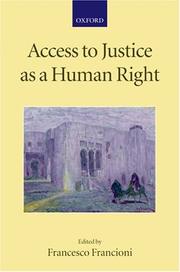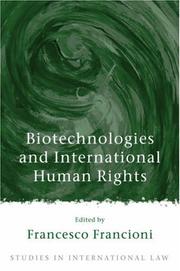| Listing 1 - 10 of 36 | << page >> |
Sort by
|

ISBN: 9780199233083 9780199233090 Year: 2007 Publisher: Oxford Oxford University Press
Abstract | Keywords | Export | Availability | Bookmark
 Loading...
Loading...Choose an application
- Reference Manager
- EndNote
- RefWorks (Direct export to RefWorks)
Human rights --- European law --- mensenrechten --- Due process of law. --- Human rights. --- Justice, Administration of. --- Legal aid. --- Administration of justice --- Justice, Administration of --- Law --- Courts --- Basic rights --- Civil rights (International law) --- Rights, Human --- Rights of man --- Human security --- Transitional justice --- Truth commissions --- Access to justice (Due process of law) --- Procedural due process --- Substantive due process --- Civil rights --- Legal charities --- Legal assistance to the poor --- Law and legislation --- Due process of law --- Legal aid

ISBN: 1841132179 9781841132174 Year: 2001 Publisher: Oxford ; Portland, Or. : Hart Pub.,
Abstract | Keywords | Export | Availability | Bookmark
 Loading...
Loading...Choose an application
- Reference Manager
- EndNote
- RefWorks (Direct export to RefWorks)
Environmental law, International --- Foreign trade regulation. --- Human rights. --- Environnement (Droit international) --- Commerce extérieur --- Droits de l'homme (Droit international) --- Economic aspects. --- Aspect économique --- Réglementation --- Commerce extérieur --- Aspect économique --- Réglementation --- Environmental law, International - Economic aspects.

ISBN: 9781841137032 1841137030 Year: 2007 Publisher: Oxford Hart
Abstract | Keywords | Export | Availability | Bookmark
 Loading...
Loading...Choose an application
- Reference Manager
- EndNote
- RefWorks (Direct export to RefWorks)
Biotechnology industries --- Biotechnology industries. --- Biotechnology --- Human rights --- Law and legislation --- Safety measures. --- International cooperation. --- Chemical engineering --- Genetic engineering --- Biomedical industries --- High technology industries
Book
ISBN: 0191696587 9780191696589 Year: 2007 Publisher: New York ; Oxford Oxford University Press
Abstract | Keywords | Export | Availability | Bookmark
 Loading...
Loading...Choose an application
- Reference Manager
- EndNote
- RefWorks (Direct export to RefWorks)
This collection of essays offers seven distinct perspectives on the status of access to justice: its development in customary international law, its protection in times of emergency, its problematic exercise in the case of violations of the law of war, its application to torture victims, and much more.
Legal aid --- Due process of law --- Human rights --- Justice, Administration of --- Law, Politics & Government --- Law, General & Comparative --- Administration of justice --- Law --- Courts --- Basic rights --- Civil rights (International law) --- Rights, Human --- Rights of man --- Human security --- Transitional justice --- Truth commissions --- Access to justice (Due process of law) --- Procedural due process --- Substantive due process --- Civil rights --- Legal charities --- Legal assistance to the poor --- Law and legislation
Book
Year: 1992 Publisher: London Pinter
Abstract | Keywords | Export | Availability | Bookmark
 Loading...
Loading...Choose an application
- Reference Manager
- EndNote
- RefWorks (Direct export to RefWorks)
European law --- Italy
Book
ISBN: 0861870000 Year: 1992 Publisher: London : Pinter Publishers,
Abstract | Keywords | Export | Availability | Bookmark
 Loading...
Loading...Choose an application
- Reference Manager
- EndNote
- RefWorks (Direct export to RefWorks)
Book
ISBN: 1472562399 1280801247 9786610801244 184731239X Year: 2001 Publisher: Oxford ; Portland, Oregon : Hart Publishing,
Abstract | Keywords | Export | Availability | Bookmark
 Loading...
Loading...Choose an application
- Reference Manager
- EndNote
- RefWorks (Direct export to RefWorks)
After the completion of the Uruguay Round and the adoption of the 1994 agreement establishing the WTO,the place of international trade in the context of the international legal order has radically changed. International trade law has become a subject of wide-spread interest, cutting across traditional boundaries, and engaging diverse political and legal concerns. One consquence of this development is increasing concern with the legitimacy of the WTO process, which in turn has led to the WTO becoming the focus of rancorous protest by, among others, environmental NGOs, trade unions, and human rights activists. This collection of essays by leading scholars and lawyers engaged in the policy-making process, addresses the underlying tensions and dilemmas of the WTO process and its impact upon the environment and human rights in particular. The contributors search for a balance between, on the one hand, legitimate free trade interests and, on the other, the role and limits of unilateral measures as an instrument to protect non-commercial values. The essays thus range over a host of topical questions including: trade in GMOs, biosafety in intellectual property rights, technology transfer and environmental protection, trade and labour rights, child labour standards, the EU and WTO, MERCOSUR, and many other topics. The contributors include: Thomas Schoenbaum, Andrea Bianchi, Chris McCrudden, Michael Spence, Sarah Cleveland, Patricia Hansen, Riccardo Pavoni, and Francesco Francioni
Environmental law, International --- Foreign trade regulation. --- Human rights. --- Economic aspects. --- Foreign trade regulation --- Environmental aspects.
Book
ISBN: 1472563875 1281165697 9786611165697 1847313507 Year: 2007 Publisher: Oxford ; Portland, Oregon : Hart Publishing,
Abstract | Keywords | Export | Availability | Bookmark
 Loading...
Loading...Choose an application
- Reference Manager
- EndNote
- RefWorks (Direct export to RefWorks)
"This book follows and complements the previous volume Biotechnology and International Law (Hart 2006) bringing a specific focus on human rights. It is the result of a collaborative effort which brings together the contributions of a select group of experts from academia and from international organisations with the purpose of discussing the extent to which current activities in the field of biotechnology can be regulated by existing human rights principles and standards, and what gaps, if any, need to be identified and filled with new legislative initiatives. Instruments such as the UNESCO Declaration on the Human Genome (1997) and on Bioethics and Human Rights (2005) are having an impact on customary international law. But what is the relevance of these instruments with respect to traditional concepts of state responsibility and the functioning of domestic remedies against misuse of biotechnologies? Are new legislative initiatives needed, and what are the pros and cons of a race toward the adoption of new ad hoc instruments in an area of such rapid technological development? Are there risks of normative and institutional fragmentation as a consequence of the proliferation of different regulatory regimes? Can we identify a core of human rights principles that define the boundaries of legitimate uses of biotechnology, the legal status of human genetic material, as well as the implications of the definition of the human genome as 'common heritage of humanity' for the purpose of patenting of genetic inventions? These and other questions are the focus of a fascinating collection of essays which, together, help to map this emerging field of inquiry."--Bloomsbury Publishing.
Biotechnology industries --- Biotechnology --- Human rights --- Law and legislation
Article
Abstract | Keywords | Export | Availability | Bookmark
 Loading...
Loading...Choose an application
- Reference Manager
- EndNote
- RefWorks (Direct export to RefWorks)
ANTARCTIQUE --- CONSERVATION DE LA NATURE --- ENVIRONNEMENT --- ANTARCTIQUE --- CONSERVATION DE LA NATURE --- ENVIRONNEMENT
Book
ISBN: 9780199680245 0199680248 Year: 2013 Publisher: Oxford, United Kingdom : Oxford University Press,
Abstract | Keywords | Export | Availability | Bookmark
 Loading...
Loading...Choose an application
- Reference Manager
- EndNote
- RefWorks (Direct export to RefWorks)
International law --- Cultural property --- Protection (International law) --- Protection (International law).
| Listing 1 - 10 of 36 | << page >> |
Sort by
|

 Search
Search Feedback
Feedback About UniCat
About UniCat  Help
Help News
News